To read this issue in your browser, click on the headline above.
Eric Zorn is a former opinion columnist for the Chicago Tribune. Find a longer bio and contact information here. This issue exceeds in size the maximum length for a standard email. To read the entire issue in your browser, click on the headline link above. Become a paid subscriber to receive each Picayune Plus in your email inbox each Tuesday and join our civil and productive commenting community.
Lightfoot’s heavy handed play for Black votes
“Any vote coming from the South Side for somebody not named Lightfoot is a vote for Chuy Garcia or Paul Vallas,” Lightfoot said, naming the only Latino and white challengers in the race. — from a Tribune account of Mayor Lori Lightfoot’s campaign rallies on the South and West sides Saturday.
Lightfoot’s supporters in next Tuesday’s election have increased the volume of their pleas to Black voters to “keep the seat” by choosing her over six African American rivals in next Tuesday’s election. By reminding audiences that the “destiny” of Black Chicago is on the ballot, her campaign is clearly thinking that the strongest of these rivals — Cook County Commissioner Brandon Johnson and philanthropist Willie Wilson — will so divide the Black vote that Lightfoot won’t finish in the top two and so won’t make the expected April 4 runoff election.
Monday Lightfoot kept race front and center when she accused former public schools CEO Vallas of blowing “the ultimate dog whistle” when he tells crowds that his campaign is about “taking our city back.”
“What does that mean?” Lightfoot said.”To what time? And take our city back from whom?”
There is no percentage in arguing Lightfoot’s charge. Either you hear the “take back” rhetoric as a hackneyed campaign appeal to take power away from allegedly ineffective leaders or you hear it as veiled racism.
Either way, though Lightfoot is asking us to view this election in racial terms.
Lightfoot has recently made a series of comments urging Black residents to coalesce behind her candidacy or risk losing City Hall. Lightfoot recently stood with a group of ministers who criticized other Black candidates for being in the race and potentially dividing up community support on the South and West sides.
Rush made the same argument at Saturday’s rally, leading residents in chanting, “keep the seat” and “down with the wannabes and up with Lori.”
Shades of 1987, when Cook County Judge Eugene Pincham declared, “Any man south of Madison Street who casts a vote in the Feb. 24 election and who doesn’t cast a vote for Harold Washington ought to be hung.”
That line was repeated almost verbatim in 1989 by Thomas Todd, the former national director of Operation PUSH, after Washington died and his successor, Eugene Sawyer, was facing then-States Attorney Richard M. Daley: “Any man or woman, south of Madison, north of Madison, east of Madison, west of Madison, who votes for Richard Daley ought to be hung. Daley is the white hope. . . . Whether they are qualified or not, any old white person will do. Just get any black person out. . . . It is simply because he is a white man. Race is not an issue in this campaign. It is the only issue.”
In Cook County,the president of the county board, the state’s attorney and the chief judge of the circuit court are Black. In Chicago, the mayor, city treasurer and police superintendent are Black. Statewide, the attorney general and lieutenant governor are Black. The political destiny of Black Chicago does not hang in the balance. There will be other Black mayors in the city’s future and, in all likelihood, Hispanic, white and Asian American mayors as well.
The mayor’s seat belongs to no ethnic group to keep or take back from another group. It would be nice to agree on that and focus on performance and qualificiations.
Ideally Lightfoot would have stayed above the fray in the name of civic unity. Four years ago, strong support among white voters catapulted her to victory. Her implication that racism animates their dissatisfaction with her today is disappointing.
And yet bringing wavering Johnson and Wilson voters over to her side in the name of solidarity is likely her best hope next week, even though drawing racial/ethnic battle lines risks giving Garcia and Vallas an overall edge when the Black field is so split.
I will be inviting specific predictions in Thursday’s Picayune Sentinel for those bold enough to make wild guesses. And I’ll tell you mine.
New polling on the theoretical mayoral matchups
The race for mayor of Chicago is almost certain to come down to a top-two runoff on April 4, and an independent Victory Research poll posted last week shows that in theoretical head-to-head matchups:
Paul Vallas beats everyone Chuy Garcia beats incumbent Mayor Lori Lightfoot, Brandon Johnson and Willie Wilson Johnson beats Wilson and Lightfoot Wilson beats Lightfoot Lightfoot loses every time.
The poll results show that Garcia would come the closest to beating Vallas, losing by 5 percentage points. But 17% of respondents said they were undecided in such a matchup.
As for next Tuesday’s election, the poll has it as —
Vallas 23 % Lightfoot 17 % Johnson 16% Garcia 14% Wilson 12%
— with a margin of error of 3.45%. But at the time the poll of 806 likely voters was taken — Feb 12-15, — fully 44% of respondents said they could still change their minds, and 12.5 % said they were still undecided.


Clarifications and corrections
In responding to my post “Really, Chuy? Watching the SOTU in person was more important than participating in a major mayoral forum?” a number of readers defended U.S. Rep. Chuy Garcia’s decision to skip the Feb. 7 mayoral forum on WTTW-Ch. 11 in favor of attending the State of the Union speech in Washington, D.C.. In mounting their defense, some blamed the TV station for scheduling the event on the same night as the speech. But the candidates agreed to the date of the forum in late November, according to station news director Jay Smith, well before Jan. 13 when Congress set the date for President Joe Biden’s speech. “By that time, it was impractical for us to try and reschedule nine candidates on short notice,” Smith told me.
Last Thursday I referred to an article in “the Gary Post-Tribune.” The northwest Indiana sister paper to the Chicago Tribune has been known simply as the Post-Tribune for quite a while and I never adjusted my thinking or changed my colloquial way of referencing the paper. I regret the error. This geographical unmooring of journalistic enterprises is increasingly common, which I see when I seek out regional coverage of important stories. Many publications have removed city names from their mastheads in what must be a market-tested effort to expand circulation.
My apology to and debate with Charles Thomas
I also regret having mistakenly written that former ABC-7 political reporter Charles Thomas has endorsed Paul Vallas for mayor. In fact, Thomas has endorsed Willie Wilson. I apologized to Thomas via email when he wrote to call attention to my error and to say that he remains “a political independent who at this time in history is more interested in joining the Republican conversation. That debate highlights issues such as family values, public safety, school choice and economic development vs. growth of the welfare system.” In my apology to him I added this:
I was surprised and disappointed to see a person of your experience and obvious intelligence throw in so publicly with Wilson. And I'm even more surprised today that you'd think he has the skill set to be the mayor of Chicago. From your years covering City Hall, you know what a complex job it is trying to run a huge bureaucracy and balance the demands of a variety of constituencies in ways that move the city forward in key metrics. It's hard to believe anyone would even want the job. And it's impossible for me to believe that Wilson has the political or policy chops to do it. As far as I can tell, Wilson thinks all we need to do is cut taxes and encourage police to brutalize criminals. The "Issues" page of his campaign website contains fewer than 300 words, most of them vague banalities on the order of "We need to help Chicagoans create the new post-pandemic normal.This means listening closely to citizens' needs and working together with inclusion as the guiding light to meet the unique needs of Chicago's diverse groups." Tell me why anyone who wants to be in "the Republican conversation" would support Wilson over the vastly more experienced, right-leaning Paul Vallas.
Thomas replied:
Wow! Do you realize what you just wrote?
How could you conclude that Willie Wilson is somehow less qualified to be mayor than Bruce Rauner or J.B. Pritzker to be governor. They're all businessmen with a lot of money and no prior government experience. And Pritzker inherited his wealth as opposed to earning it as the other two have done.
So what makes Wilson different?
Hmm...
I wrote back:
Well, Rauner, whom I never supported, has an economics degree from Dartmouth College and a Harvard MBA. Pritzker is a Northwestern Law School graduate. Wilson has a seventh grade education.
I'm not one who thinks the most credentialed person is the most deserving of high public office nor one who thinks government experience or advanced degrees are prerequisites to good leadership. Given the choice and all other things being mostly equal, I'd prefer candidates with government experience and relevant education over those without it.
But my brief against Wilson is that he shows almost no command of the complex problems facing the city -- again, I direct you to the feeble, skimpy and banal "Issues" page of his campaign website or to the simplistic answers he offers on questionnaires.
Why, from your perspective, is he a better right-leaning mayoral hopeful than Paul Vallas?
I gave the last word, who is not affiliated with or paid by the Wilson campaign:
Dartmouth?
Harvard?
Northwestern?
Wilson literally ran away from a Southern plantation. He not only survived his escape, but also thrived after turning a fast food custodians job into a $60 million dollar a year international medical supply company.
As a boy and young man growing up in the United States, I heard stories — real and fantasized — of people like Willie Wilson, who not only survived their escape from captivity but have thrived in their relative freedom.
He is a living composite of the millions of Southerners who arrived here during the "Great Migration."
It truly is a "Black Thing" when I contend that Wilson's life experience trumps Rauner's and Pritzker's.
Notes and comments from readers —lightly edited —- along with my responses
Jake H. — Regarding your support for the controversial decision by Valparaiso University to sell off three valuable art works from its campus art museum in order to fund dorm improvements: I am sympathetic with the museum-world ethos that art is only to be sold to buy other art, and not for operating expenses or anything else. It's often really easy to discount the value of artwork in the face of more immediate, more concrete concerns.
Detroit had a real scare when the city went bankrupt. Its amazing world-class museum full of unique treasures was publicly owned, and many thought those treasures should be sold off to cover the city's more pressing social and economic challenges.
You might say, well, art is the "core mission" of the Detroit Institute of Arts, but it's not really the core mission of the City of Detroit. It's an amenity, one that attracts many visitors but probably not much needed investment.
And yet the city, the Midwest, and the world would have been forever poorer in ways difficult to quantify if it had been allowed to go away. Luckily, a deal with donors was struck, and the museum was transferred to a charitable trust, albeit sapping its endowment, to save it from the tender mercies of the bankruptcy court.
And the loss is forever while the gain is perhaps short-lived.
The stakes are not nearly so high in the Valpo case and maybe it doesn't even belong in the same discussion. I only bring it up because we have real reason to worry when institutions in decline start selling off their masterpieces to make ends meet.
Lori F — I was one the very few who voted that Valpo should not sell those paintings. But if you’d offered more than two options, I could have selected a more reasoned reply. I think it’s okay for Valpo to sell, but I don’t think they should do so to make dorms more attractive to prospective students. Pumping big money into making a college more fun and homey for students was a main reason why these institutions fell into financial trouble a number of years ago and then raised tuition costs to the moon. Colleges have lost their focus and mission, and catering to cushier lifestyles is but one of symptoms.
I was expecting more dissent on that item, and was startled by this poll result:
My sense is that this result reflects an impatience with the inflated emotional and literal economy in the art world, where the line between a prank and a masterpiece is often fuzzy, where value is often based merely on the identity of the artist and not the quality of the work, and where collecting and curating cam seem like mere fetishism.
Yes, there is magic in seeing originals — copies of the Constitution, garments worn by famous people, canvases touched by the brushes of modern masters and so on. Even ticket stubs, programs, game jerseys, newspaper front pages and autographs have similar power. They fire the imagination in ways that copies, no matter how exact, do not.
Would budding artists or art historians at Valparaiso University be more inspired by gazing upon the original of Georgia O’Keeffe’s “Rust Red Hills” — the most valuable item on the block, said to be worth $15 million — than they would be looking at a near-exact but essentially worthless replica? Probably, since that’s how humans are wired.
But is the University better off channeling its resources and holdings into campus improvements and allowing other institutions or people to invest in the weird economy of art?
David A. — Do whatever ruthless thing has to be done to keep the university open. If that means hocking a painting I have no recollection of seeing when I attended Valparaiso University or selling the chapel organ for parts, so be it. The previous regimes failed to plan for the demographic slump in the number of kids hitting college-age, and the fact is that it is now a buyers’ market. Kids who have parents with enough money to pay Valpo's tuition probably, even those with bad grades and test scores, get to be selective. They won't settle on the school with the dumpy residence halls and few amenities, especially if it's stuck out on the frozen prairie of northern Indiana. Are we catering to entitled brats? Maybe. I don't care. I just don't want to have to tell anyone that "I went to a great university that no longer exists."
One dissenting correspondent raised the issue of how such sales stand to undermine the culture of art philanthropy if donors come to fear that their gifts will be sold to the highest bidder. That’s an excellent point, and one that suggests that all such donations ought to be conditional, made with certain signed agreements about the ultimate disposition of the donations. (Of course a gift with strings attached isn’t really a gift, now is it?)
As to the idea that campuses are becoming disagreeably luxe as institutions vie to attract students, I’m sympathetic. I lived for two years in a Soviet-style cinderblock room at the University of Michigan’s Mary Markley Hall where we had no climbing wall or dorm cafe or lazy river! But when prospective students tour campuses these days, they do consider the amenities.
I remain interested in the Valpo story and am eager to post views that contrast with my own on this.
C. Pittman —For anyone to be against Paul Vallas just because some Republicans and even some MAGA jerks support him is divisive and unfair. Vallas has not espoused one policy that is not centrist Democrat. And if you remember correctly charter schools were originally a bipartisan idea supported by Obama and Arnie Duncan. While Vallas’s time as Chicago, New Orleans, and Philadelphia head of schools has not completely turned them around, he certainly did not privatize them. Your points about Lightfoots’ personality flaws are spot on ( although I think she has tried to navigate the minefield of this city in a measured way) and Garcia has offered absolutely no solutions except his clout in the Hispanic community. Sofia King seems very capable but I don’t think she can make it to the top two. Wilson and Johnson are very scary options for our future!
Vallas is enthusiastic about privatizing public education and I don’t consider that a centrist Democratic position. Charter schools are certainly a mixed bag and I look forward to the education debate we’re going to have in the next six week if Vallas makes the top two, as I predict he will.
Jake H. — School choice results in poaching of the motivated and talented. It incentivizes abandonment of the local school. What could be a better example of, to use a popular word these days, "disinvestment"? I've come to the view that neighborhood schools should be seen as the rule, not the exception. I'm not sure how you can have any hope of revitalizing distressed communities if you rob them of their institutions. I don't say eliminate all selective enrollment or specialty schools. But I would limit their reach to the especially gifted -- in STEM, performing arts, leadership and policy, what-have-you -- and insist on vibrant local schools capable of serving the varying academic and social needs of the local population. Or, at least, that would be the sort of world I'd want to move toward.
The privatizers' mantras about business-like competition is all well and good -- in markets for, say, candy bars or some such, where failure (the crappy candy bar company goes out of business or changes its offerings or whatever) entails virtually no social costs, only consumer benefit. The same cannot be said for schools and community institutions generally. We have an obligation, do we not, to leave no child behind, to coin a phrase.
Mark H. — I was happy to see your link to Bari Weiss’ work in last week’s newsletter. I think there’s some compelling work going on at The Free Press, her online publication. She and her writers appear determined to challenge the zombie-like conventional wisdom of both the left and right. Sorry, but I’m hearing lots of politically-tinged echo chambers in MSM and The Free Press is an antidote to that.
I took some grief from my lefty friends for linking to the episode of Weiss’ podcast in which she moderated a debate among medical experts f about Ozempic, the Type 2 diabetes medication now booming in popularity because of its off-label use for weight loss. I have my disagreements with Weiss but I refuse to be part of the pile-on culture that says once a person has expressed an opinion with which you differ strongly, that person is toxic and cannot and should not be taken seriously on any subject.
I see this with Andrew Sullivan, Bill Maher and any number of pundits who are utterly reviled on the left for not hewing to the party line on every subject. Sure, subject their arguments to more careful scrutiny. But “Oh, Bari Weiss, really?” is not an argument and is not persuasive.
Rick W. — I would like to see a citation for your assertion that over 100 billion people have already died in your item arguing that the idea of ghosts is absurd. My internal estimator thinks that number is way too big.
It does seem high, I admit. But take a look at “This is how many humans have ever existed, according to researchers” from the World Economic Forum and “How Many People Have Ever Lived on Earth? The global population milestone of 8 billion represents nearly 7% of the total number of people who have ever lived” from the Population Reference Bureau.
More mail about the Trib’s subscription practices
Margaret B. — This came in the mail today, and we’re finding it harder and harder to justify our Tribune subscription:
Several subscribers sent this to me so I called the number and spoke to a customer service representative in the Philippines. She explained, as the card ought to have, that the surcharge was based on increased costs of motor fuel, which doesn’t totally make sense, as gas prices are well off the highs of last summer.
She also assured me that the surcharge was temporary, but I wondered why the paper could offer such an assurance under the circumstances. She didn’t know and I asked to speak to a supervisor. But no one was available to speak with me.
Thomas B — I got a notification that the Tribune is now charging me $46 for two months of digital and Sunday-only delivery. That’s a $10 increase. I pay $4 a month for the digital New York Times and $8 a month for the digital Washington Post . And each gives a whole lot more content than the Trib. I called customer service at the Trib. I was given no break for dropping Sunday delivery. They did agree to go back to charging me $36. I thought I would be the last person in the world to drop his local newspaper but the Tribune is making it very hard for me to stay.
I certainly understand the financial pressure on media outlets — particularly print — these days. And I continue to argue that strong local newspapers are vital to civic health. Yet the Tribune’s lack of pricing consistency and transparency vexes me. Why, for instance, can’t subscribers simply go online and see the current terms of their subscriptions?
Why do they force you to call every six months to opt out of the “premium issue” charge instead of simply allowing you to opt out permanently?
Here’s one thing I do know — I’m paying the Tribune roughly $7.50 per month for digital access with Sunday home delivery, meaning Thomas B. is paying about $10 more a month than I am for the same service. I doubt the company wants him or anyone paying a higher rate to know that. And I’ll bet there are people who work the angles harder than I do who pay even less.
I sent a draft of this item Monday afternoon to Tribune publisher Par Ridder for his response. He’s ignored my emails in the past and as of 5 a.m. Tuesday he’s ignoring this one.
Ya gotta see these tweets!
I often run across tweets that rely on visual humor and so can’t be included in the Tweet of the Week contest (the template I use for that poll does not allow me to include images). Here are a few good ones I’ve come across recently:
The Pixar presidents look like cast of great caper movie, with Gerald Ford as the big boss and George W. Bush as his idiot henchman.
Vote for your favorite. I’ll share the winner in Thursday’s main edition.
There’s still time to vote in the conventional Tweet of the Week poll!
Thank you for supporting the Picayune Sentinel. To help this publication grow, please consider spreading the word to friends, family, associates, neighbors and agreeable strangers.
.











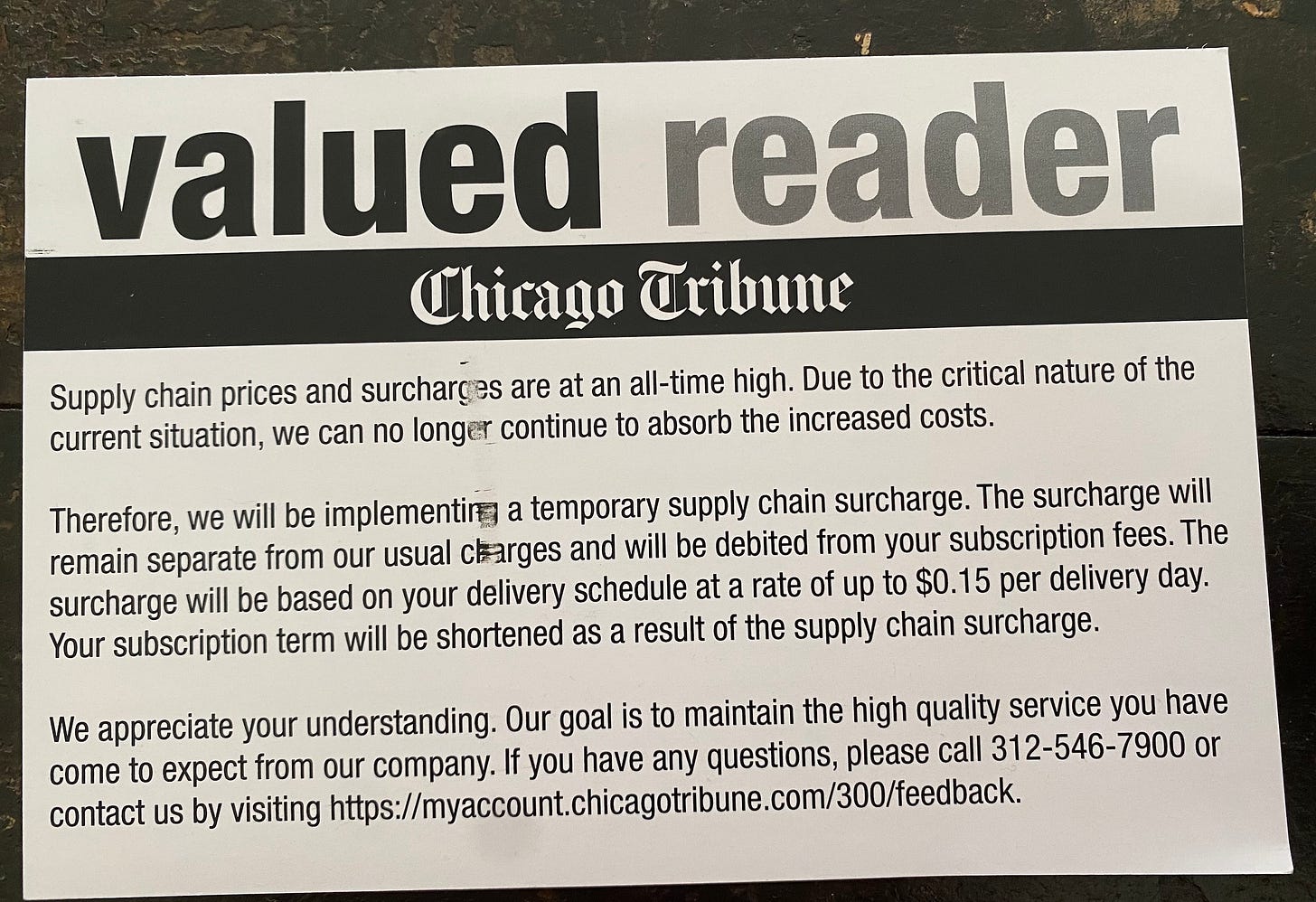


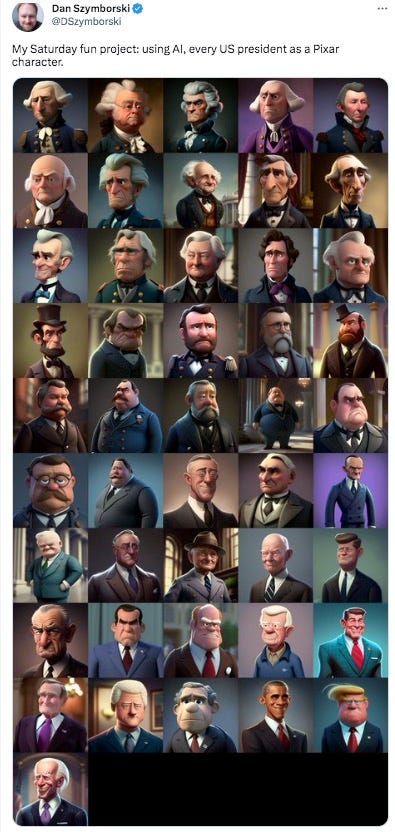
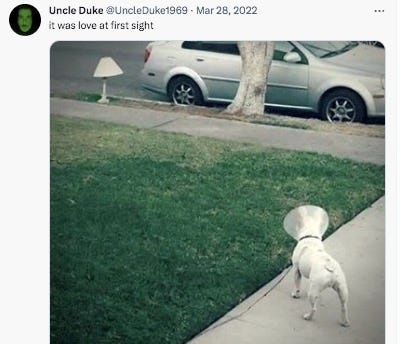

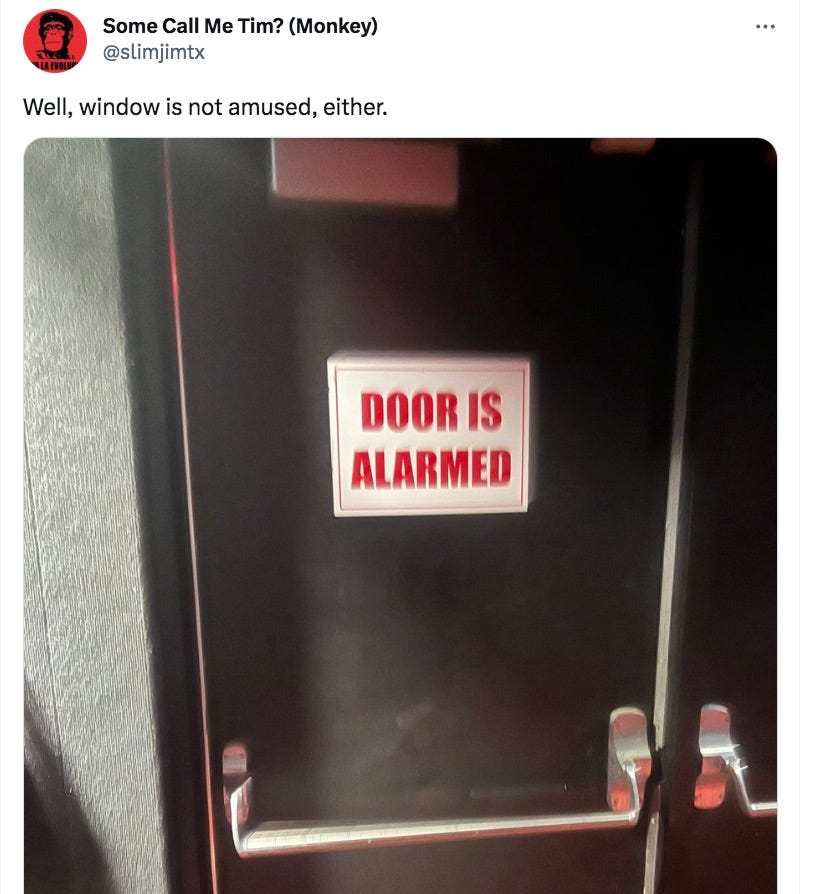
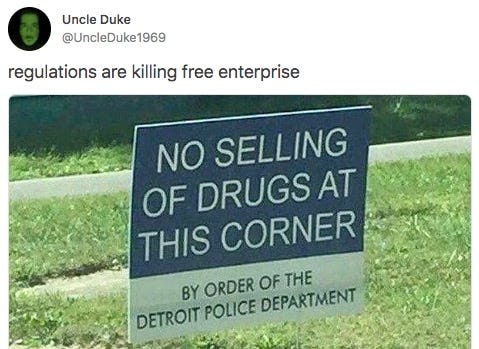

Paul Vallas' comments about taking the city back are not necessarily tinged with race. Sure, they could be considered as such. But a huge swath of Chicagoans feel that their once great city has been largely taken over by criminals. While the entire city is not one huge crime scene, so much of it is- and citizens throughout Chicago have an underlying fear that crime might strike them or their community at any time. So unlike Lori Lightfoot or Judge Peacham, I don't see Mr. Vallas as leaning on racial division. And I might add that it should have no place in our politics.
The apparent tolerance of Chicagoland in general to blatantly black racism appeals by Lightfoot and Bobby Rush is a textbook example how the city remains mired in tribalism and racial identity politics. Yes, individuals and some media have noted this, but only in relatively mild rebuke, and the Lightfoot campaign calculus is that the benefit of these nasty racial appeals outweigh the cost among reasonable minded voters. Imagine the meltdown in the media and in general today if Vallas or any other white candidate made such naked racial appeals to white voters.
If Vallas makes the runoff with Garcia or any of the black candidates, we can expect the race card to be played against him 24/7 until the runoff election. There is a long history of racial politics in Chicago, especially in the days of Harold Washington with overt racist appeals on both sides. It would be wonderful if Chicago voters would rise up in strong rejection to these despicable racial politics, but there is little reason for optimism this will occur any time in the foreseeable future. That is very sad, and leaves Chicago much less than it could be.